非谓语动词用法辨析
- 格式:doc
- 大小:84.00 KB
- 文档页数:13
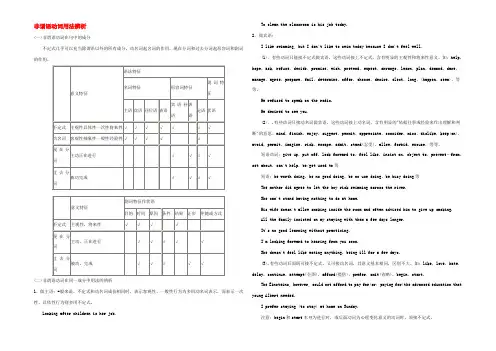
非谓语动词用法辨析(一)非谓语动词在句中的成分不定式几乎可以充当除谓语以外的所有成分,动名词起名词的作用。
现在分词和过去分词起形容词和副词的作用。
(二)非谓语动词在同一成分中用法的辨析1.做主语:-般来说,不定式和动名词成份相同时,表示客观性、一般性行为为多用动名词表示,而表示一次性、具体性行为则多用不定式。
Looking after children is her job.To clean the classroom is his job today.2.做宾语:I like swimming, but I don't like to swim today because I don't feel well.(1).有些动词只能接不定式做宾语,这些动词接上不定式,含有明显的主观性和将来性意义。
如:help,hope,ask,refuse,decide,promise,wish,pretend,expect,arrange,learn,plan,demand,dare,manage,agree,prepare,fail,determine,offer,choose,desire,elect,long,(happen,seem),等等。
He refused to speak on the radio.He desired to see you.(2)..有些动词只接动名词做宾语,这些动词接上动名词,含有明显的"依据往事或经验来作出理解和判断"的意思。
mind,finish,enjoy,suggest,permit,appreciate,consider,miss,dislike,keep(on),avoid,permit,imagine,risk,escape,admit,stand(忍受),allow,forbid,excuse,等等。
短语动词:give up,put off,look forward to,feel like,insist on,object to,prevent…from,set about,can't help,be/get used to等短语:be worth doing,be no good doing,be no use doing,be busy doing等The mother did agree to let the boy risk swimming across the river.She can't stand having nothing to do at home.His wife doesn't allow smoking inside the room and often advised him to give up smoking.All the family insisted on my staying with them a few days longer.It's no good learning without practicing.I'm looking forward to hearing from you soon.She doesn't feel like eating anything,being ill for a few days.(3).有些动词后面既可接不定式,又可接动名词,其意义基本相同,区别不大。
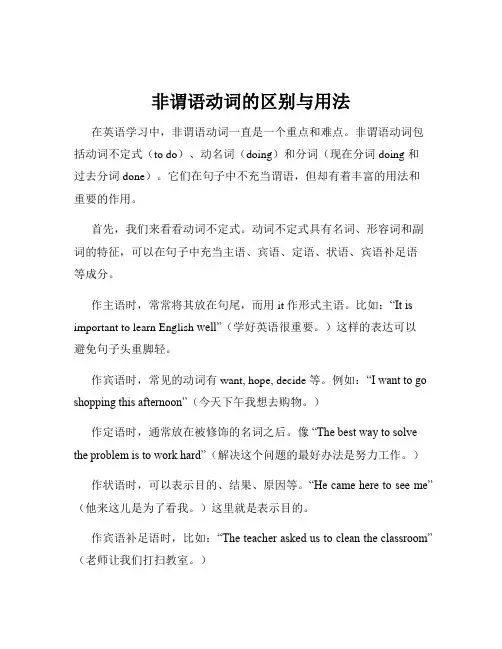
非谓语动词的区别与用法在英语学习中,非谓语动词一直是一个重点和难点。
非谓语动词包括动词不定式(to do)、动名词(doing)和分词(现在分词 doing 和过去分词 done)。
它们在句子中不充当谓语,但却有着丰富的用法和重要的作用。
首先,我们来看看动词不定式。
动词不定式具有名词、形容词和副词的特征,可以在句子中充当主语、宾语、定语、状语、宾语补足语等成分。
作主语时,常常将其放在句尾,而用 it 作形式主语。
比如:“It is important to learn English well”(学好英语很重要。
)这样的表达可以避免句子头重脚轻。
作宾语时,常见的动词有 want, hope, decide 等。
例如:“I want to go shopping this afternoon”(今天下午我想去购物。
)作定语时,通常放在被修饰的名词之后。
像“The best way to solve the problem is to work hard”(解决这个问题的最好办法是努力工作。
)作状语时,可以表示目的、结果、原因等。
“He came here to see me”(他来这儿是为了看我。
)这里就是表示目的。
作宾语补足语时,比如:“The teacher asked us to clean the classroom”(老师让我们打扫教室。
)接下来是动名词。
动名词具有名词的特征,在句中可以充当主语、宾语、定语等成分。
作主语时,谓语动词要用单数形式。
例如:“Swimming is good for your health”(游泳对你的健康有好处。
)作宾语时,常见的动词有 enjoy, finish, practice 等。
比如:“I enjoy reading book s in my spare time”(我业余时间喜欢读书。
)作定语时,通常表示被修饰词的用途。
“A swimming pool”(游泳池),这里的“swimming”就表示“pool”的用途。
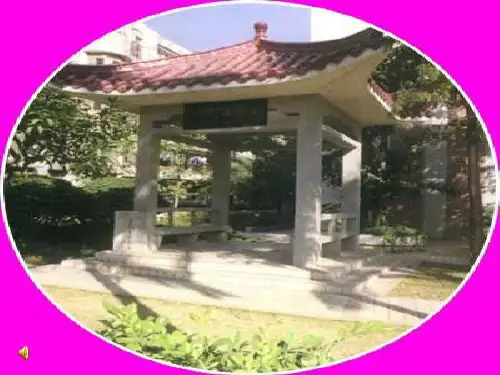
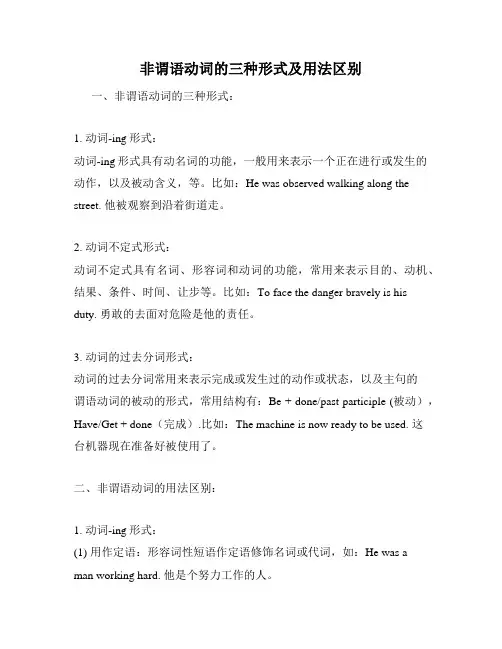
非谓语动词的三种形式及用法区别一、非谓语动词的三种形式:1. 动词-ing形式:动词-ing形式具有动名词的功能,一般用来表示一个正在进行或发生的动作,以及被动含义,等。
比如:He was observed walking along the street. 他被观察到沿着街道走。
2. 动词不定式形式:动词不定式具有名词、形容词和动词的功能,常用来表示目的、动机、结果、条件、时间、让步等。
比如:To face the danger bravely is his duty. 勇敢的去面对危险是他的责任。
3. 动词的过去分词形式:动词的过去分词常用来表示完成或发生过的动作或状态,以及主句的谓语动词的被动的形式,常用结构有:Be + done/past participle (被动),Have/Get + done(完成).比如:The machine is now ready to be used. 这台机器现在准备好被使用了。
二、非谓语动词的用法区别:1. 动词-ing形式:(1) 用作定语:形容词性短语作定语修饰名词或代词,如:He was aman working hard. 他是个努力工作的人。
(2) 用作表语:Ing 形式的短语作表语,表示一个正在进行的动作或状态,如:His job is repairing the machine. 他的工作是修理机器。
2. 动词不定式形式:(1) 作宾补:动词不定式作宾补表示“目的”,“动机”,“结果”,“条件”,“时间”,“让步”等。
如:He came here to do something for us. 他来这里为我们做一些事情。
(2) 作状语:动词不定式作状语,表示“目的”,“动机”,“条件”,“时间”,“让步”等。
如:She always goes out for a walk to relax herself. 她总是出去散步来放松自己。
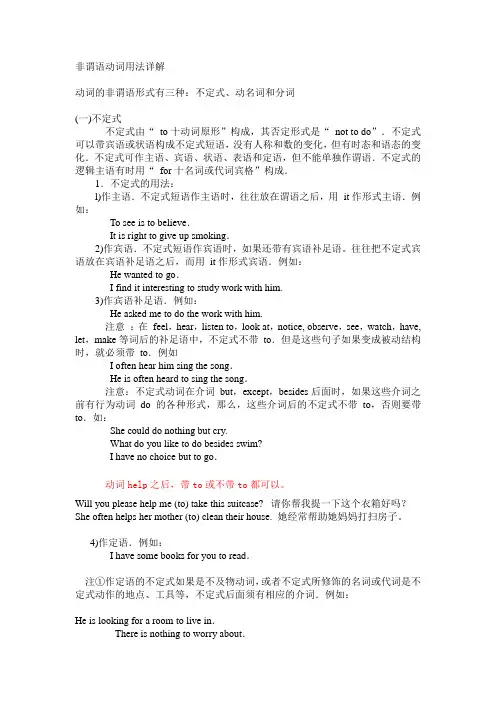
非谓语动词用法详解动词的非谓语形式有三种:不定式、动名词和分词(一)不定式不定式由“to十动词原形”构成,其否定形式是“not to do”.不定式可以带宾语或状语构成不定式短语,没有人称和数的变化,但有时态和语态的变化.不定式可作主语、宾语、状语、表语和定语,但不能单独作谓语.不定式的逻辑主语有时用“for十名词或代词宾格”构成.1.不定式的用法:l)作主语.不定式短语作主语时,往往放在谓语之后,用it作形式主语.例如:To see is to believe.It is right to give up smoking.2)作宾语.不定式短语作宾语时,如果还带有宾语补足语。
往往把不定式宾语放在宾语补足语之后,而用it作形式宾语.例如:He wanted to go.I find it interesting to study work with him.3)作宾语补足语.例如:He asked me to do the work with him.注意:在feel,hear,listen to,look at,notice, observe,see,watch,have, let,make等词后的补足语中,不定式不带to.但是这些句子如果变成被动结构时,就必须带to.例如I often hear him sing the song.He is often heard to sing the song.注意:不定式动词在介词but,except,besides后面时,如果这些介词之前有行为动词do的各种形式,那么,这些介词后的不定式不带to,否则要带to.如:She could do nothing but cry.What do you like to do besides swim?I have no choice but to go.动词help之后,带to或不带to都可以。
Will you please help me (to) take this suitcase? 请你帮我提一下这个衣箱好吗?She often helps her mother (to) clean their house. 她经常帮助她妈妈打扫房子。
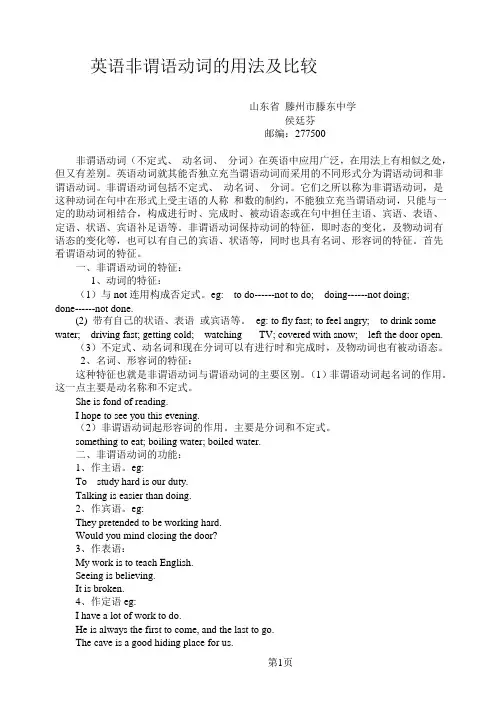
英语非谓语动词的用法及比较山东省滕州市滕东中学侯廷芬邮编:277500非谓语动词(不定式、动名词、分词)在英语中应用广泛,在用法上有相似之处,但又有差别。
英语动词就其能否独立充当谓语动词而采用的不同形式分为谓语动词和非谓语动词。
非谓语动词包括不定式、动名词、分词。
它们之所以称为非谓语动词,是这种动词在句中在形式上受主语的人称和数的制约,不能独立充当谓语动词,只能与一定的助动词相结合,构成进行时、完成时、被动语态或在句中担任主语、宾语、表语、定语、状语、宾语补足语等。
非谓语动词保持动词的特征,即时态的变化,及物动词有语态的变化等,也可以有自己的宾语、状语等,同时也具有名词、形容词的特征。
首先看谓语动词的特征。
一、非谓语动词的特征:1、动词的特征:(1)与not连用构成否定式。
eg: to do------not to do; doing------not doing;done------not done.(2) 带有自己的状语、表语或宾语等。
eg: to fly fast; to feel angry; to drink some water; driving fast; getting cold; watching TV; covered with snow; left the door open.(3)不定式、动名词和现在分词可以有进行时和完成时,及物动词也有被动语态。
2、名词、形容词的特征:这种特征也就是非谓语动词与谓语动词的主要区别。
(1)非谓语动词起名词的作用。
这一点主要是动名称和不定式。
She is fond of reading.I hope to see you this evening.(2)非谓语动词起形容词的作用。
主要是分词和不定式。
something to eat; boiling water; boiled water.二、非谓语动词的功能:1、作主语。
eg:To study hard is our duty.Talking is easier than doing.2、作宾语。
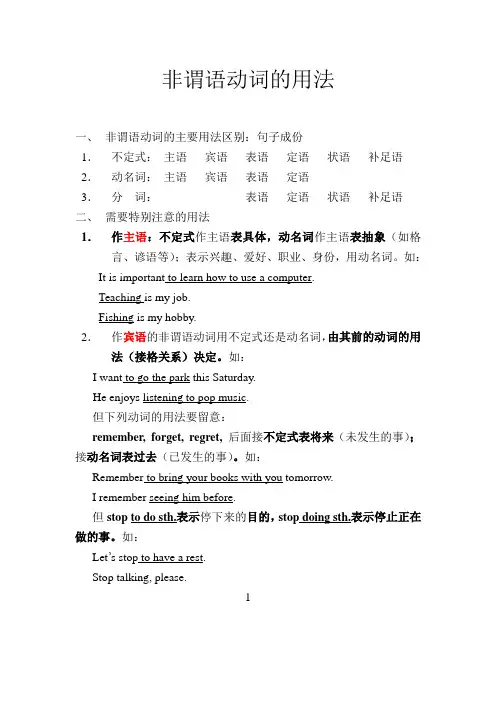
非谓语动词的用法一、非谓语动词的主要用法区别:句子成份1.不定式:主语宾语表语定语状语补足语2.动名词:主语宾语表语定语3.分词:表语定语状语补足语二、需要特别注意的用法1.作主语:不定式作主语表具体,动名词作主语表抽象(如格言、谚语等);表示兴趣、爱好、职业、身份,用动名词。
如:It is important to learn how to use a computer.Teaching is my job.Fishing is my hobby.2.作宾语的非谓语动词用不定式还是动名词,由其前的动词的用法(接格关系)决定。
如:I want to go the park this Saturday.He enjoys listening to pop music.但下列动词的用法要留意:remember, forget, regret,后面接不定式表将来(未发生的事);接动名词表过去(已发生的事)。
如:Remember to bring your books with you tomorrow.I remember seeing him before.但stop to do sth.表示停下来的目的,stop doing sth.表示停止正在做的事。
如:Let’s stop to have a rest.Stop talking, please.13.作表语:不定式作表语通常表将来,动名词作表语通常表兴趣、爱好、职业、身份(可与主语换位),分词作表语表特征或者属性(怎么样)。
如:Our task tomorrow is to study Lesson 5.My job is teaching.The story is very interesting.4.作定语:不定式作定语通常表将来(未发生),作宾语的定语时主动表被动;动名词作定语表作用或者用途;分词作定语表特征或者属性。
如:I have something to tell you.He has no pen to write with.When she writes, she usually uses writing paper.writing pen(书法笔), meeting room(会议室), dining room(餐厅), etc.That movie is very moving.The football match was very exciting.5.作状语:不定式作状语一般表目的,分词作状语不表目的。
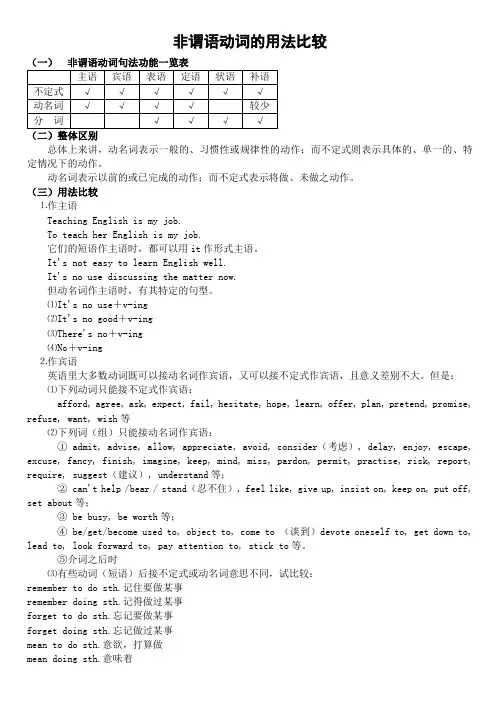
非谓语动词的用法比较(一)非谓语动词句法功能一览表总体上来讲,动名词表示一般的、习惯性或规律性的动作;而不定式则表示具体的、单一的、特定情况下的动作。
动名词表示以前的或已完成的动作;而不定式表示将做、未做之动作。
(三)用法比较⒈作主语Teaching English is my job.To teach her English is my job.它们的短语作主语时,都可以用it作形式主语。
It's not easy to learn English well.It's no use discussing the matter now.但动名词作主语时,有其特定的句型。
⑴It's no use+v-ing⑵It's no good+v-ing⑶There's no+v-ing⑷No+v-ing⒉作宾语英语里大多数动词既可以接动名词作宾语,又可以接不定式作宾语,且意义差别不大。
但是:⑴下列动词只能接不定式作宾语:afford, agree, ask, expect, fail, hesitate, hope, learn, offer, plan, pretend, promise, refuse, want, wish等⑵下列词(组)只能接动名词作宾语:① admit, advise, allow, appreciate, avoid, consider(考虑), delay, enjoy, escape, excuse, fancy, finish, imagine, keep, mind, miss, pardon, permit, practise, risk, report, require, suggest(建议), understand等;② can't help /bear / stand(忍不住), feel like, give up, insist on, keep on, put off, set about等;③ be busy, be worth等;④ be/get/become used to, object to, come to (谈到)devote oneself to, get down to, lead to, look forward to, pay attention to, stick to等。
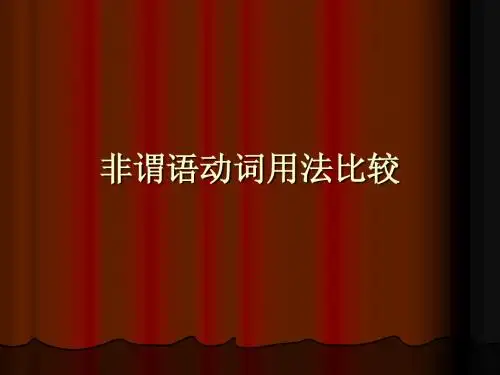
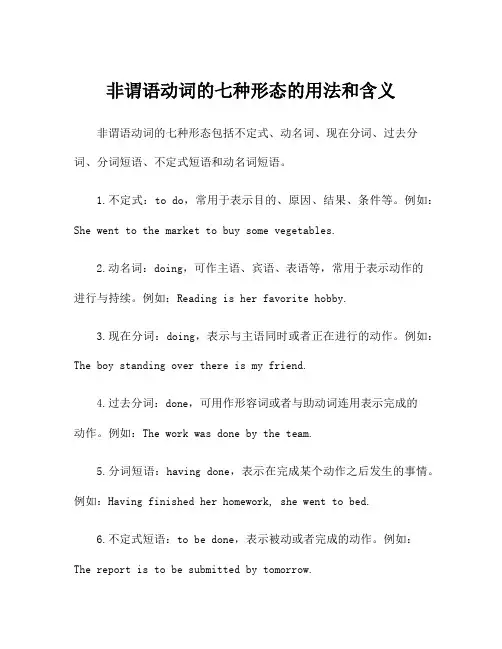
非谓语动词的七种形态的用法和含义
非谓语动词的七种形态包括不定式、动名词、现在分词、过去分词、分词短语、不定式短语和动名词短语。
1.不定式:to do,常用于表示目的、原因、结果、条件等。
例如:She went to the market to buy some vegetables.
2.动名词:doing,可作主语、宾语、表语等,常用于表示动作的
进行与持续。
例如:Reading is her favorite hobby.
3.现在分词:doing,表示与主语同时或者正在进行的动作。
例如:The boy standing over there is my friend.
4.过去分词:done,可用作形容词或者与助动词连用表示完成的
动作。
例如:The work was done by the team.
5.分词短语:having done,表示在完成某个动作之后发生的事情。
例如:Having finished her homework, she went to bed.
6.不定式短语:to be done,表示被动或者完成的动作。
例如:The report is to be submitted by tomorrow.
7.动名词短语:enjoying swimming,表示主语进行的动作是令人愉快的。
例如:She enjoys swimming in the sea.
除了以上七种形态外,非谓语动词还可以组成短语或者从句,常用于虚拟语气、句子的修饰、分句或者非限制性定语从句等。
完全掌握非谓语动词的用法对于提高英语写作和阅读水平非常重要。
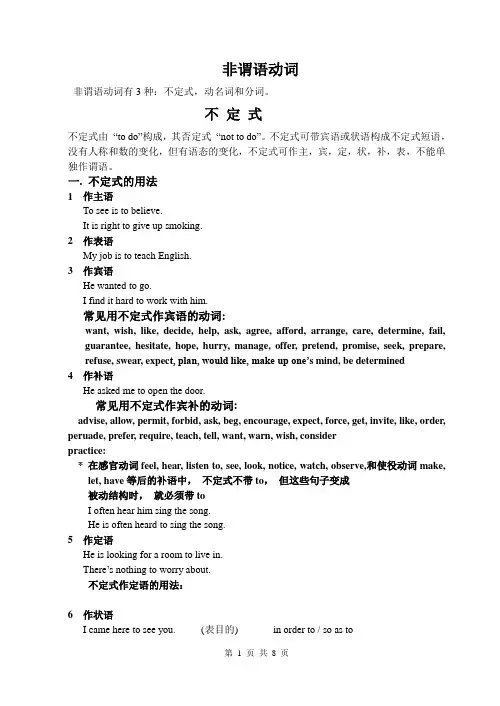
非谓语动词非谓语动词有3种:不定式,动名词和分词。
不定式不定式由“to do”构成,其否定式“not to do”。
不定式可带宾语或状语构成不定式短语,没有人称和数的变化,但有语态的变化,不定式可作主,宾,定,状,补,表,不能单独作谓语。
一. 不定式的用法1 作主语To see is to believe.It is right to give up smoking.2 作表语My job is to teach English.3 作宾语He wanted to go.I find it hard to work with him.常见用不定式作宾语的动词:want, wish, like, decide, help, ask, agree, afford, arrange, care, determine, fail, guarantee, hesitate, hope, hurry, manage, offer, pretend, promise, seek, prepare, refuse, swear, expec t, plan, would like, make up one’s mind, be determined4 作补语He asked me to open the door.常见用不定式作宾补的动词:advise, allow, permit, forbid, ask, beg, encourage, expect, force, get, invite, like, order, peruade, prefer, require, teach, tell, want, warn, wish, considerpractice:* 在感官动词feel, hear, listen to, see, look, notice, watch, observe,和使役动词make, let, have等后的补语中,不定式不带to,但这些句子变成被动结构时,就必须带toI often hear him sing the song.He is often heard to sing the song.5 作定语He is looking for a room to live in.There’s nothing to worry about.不定式作定语的用法:6 作状语I came here to see you. (表目的) in order to / so as toWe were excited to hear the news. (表原因)He hurried to the school (only) to find nobody there.(表结果7 疑问词+不定式,在句中起名词作用,可作主,宾,表He didn’t know what to say.How to solve the problem is very important.My question is when to start.8 作插入语To tell the truth, I don’t agree with you.to be sure to be frank to sum up to begin /start withto make matters worse to be brief二不定式的时态,语态1 一般式:表示的动作与谓语动作同时或在它之后发生He pretended not to know me when I met him in the street.2 进行式:表示动作发生时,不定式动作正在发生He pretended to be reading English when I entered the classroom.3 完成式:表示动作发生在谓语动作之前He is said to have learned English in Britain for a year.A railway is said to be being built now.No harm seems to have been done.四不定式的省略为避免重复可用to来代替前面的不定式,常出现在下列动词后expect, hope, wish, mean, prefer, care, forget, want, try 或出现在be glad, be happy, would like/love后eg: I haven’t been to Hong Kong, but I wish to.--- Would you come to the party?--- I’d love to, but…如果在省略不定式中含有be, have, have been 等系动词或助动词,这些词要保留。
独立主格和非谓语动词的辨析当我们学习英语语法时,经常会遇到一些比较复杂的结构,其中包括独立主格和非谓语动词。
这两个结构看起来很相似,但其实有着不同的用法和功能。
在本文中,我们将详细讨论独立主格和非谓语动词的辨析,并展示如何正确运用它们。
一、独立主格的定义和用法独立主格是指一个名词或代词短语,在句子中作为独立成分,与其他成分相对独立,不与谓语动词直接相连。
1.1 独立主格的结构独立主格由一个名词或代词作为主体,加上一个现在分词或过去分词构成。
例如:“Tom reading a book, his sister was watching TV.”(汤姆读书时,他的妹妹在看电视。
)1.2 独立主格的用法独立主格用于表示一个同时或相对于主句发生的情境或条件。
独立主格起强调或补充的作用,为句子增添信息。
1.3 独立主格的例子- Weather permitting, we will go hiking this weekend.(如果天气允许的话,我们这周末会去远足。
)- The test finished, the students left the classroom.(考试结束后,学生们离开了教室。
)二、非谓语动词的定义和用法非谓语动词是指在句子中充当动词的功能,但不具备时态和主语的形式,不能独立构成谓语动词。
非谓语动词有分词、不定式和动名词三种形式。
2.1 非谓语动词的结构2.1.1 分词:分为现在分词和过去分词。
现在分词通常以-ing结尾,过去分词通常以-ed、-en、-d、-t、-n等结尾。
2.1.2 不定式:不定式的一般形式为“to + 动词原形”。
2.1.3 动名词:动名词的一般形式为动词原形 + -ing。
2.2 非谓语动词的用法2.2.1 分词用作定语:分词可以修饰名词或代词,充当定语的作用。
例如:“The broken window needs to be repaired.”(这扇坏了的窗户需要修理。
1.做主语不定式和动词-ing形式皆可在句中做主语,但二者在意义和结构上略有不同。
(1)动词-ing形式多表示一般的、抽象的、泛指的概念或一个一完成的动作,而不定式则表示具体的某一次行为或将来的动作,不过有时二者之间区别很小。
Collecting stamps can enlarge one’s knowledge.To be an astronaut is my dream.To see is to believe. = Seeing is believing.(2)动词不定式做主语时,常用形式主语结构,而动名词做主语时较少使用形式主语,只用在It is no good\no use\useless\interesting\hard\difficult 等句型中。
在口语中,用动词-ing形式做主语置于句首的情况要比不定式多。
It is essential to make a good plan for the trip.It is fun talking with a foreign teacher.2.作表语(1)表示一般的概念时,不定式、动词-ing形式可以互换。
My favorite hobby is to collect\collecting old coins.My part-time job is to teach\teaching yoga in a school.(2)表示具体的个别的动作或者有将来的含义时,一般用不定式。
Our aim is to help the old lead a happy life.The plan is to set aside a day for the interview.My wish is to find a part-time job.(3)动词-ing形式作表语表示主动概念,过去分词作表语表示被动概念。
We were all greatly amazed at child’s wonderful performance.What he said is rather disappointing at all.3.做宾语(1)用不定式作宾语往往指具体的或一次性的行为,而动词的-ing形式则指概括性的、经常性的动作或体验。
非谓语动词主要包括不定式、动名词和现在分词。
为了区分这三种不同的非谓语动词的用法和含义,我们将分别从三种非谓语动词在句子中做主语、宾语、宾语补足语、定语、状语、表语以及一些特殊结构句型等角度来区分其用法和细微含义。
1.不定式和动名词作主语的区别(1)动名词作主语通常表示抽象动作;而不定式作主语表示具体动作。
Smoking is prohibited(禁止)here.这里禁止抽烟。
(抽象)It is not very good for you to smoke so much.你抽这么多烟对你身体很不好。
(具体)(2)动名词作主语时,通常用以表示一件已知的事或经验。
不定式短语通常用来表示一件未完成的事或目的。
Climbing mountains is interesting.爬山很有趣。
(经验)Driving a car during the rush hour is tiring.在高峰时刻开车令人厌烦。
(经验)(3)不定式做主语,一般用it当形式主语,把作主语的不定式短语后置。
It took me only five minutes to finish the job.2.不定式、动名词和分词作表语的区别(1)不定式作表语1)不定式作表语一般表示具体动作,特别是表示将来的动作。
To do two things at a time is to do neither.--次做两件事等于未做。
What I would suggest is to start work at once.我的建议是立刻开始干。
2)如果主语是不定式(表示条件),表语也是不定式(表示结果)。
To see is to believe.百闻不如一见。
To work means to earn a living.工作就是为了生活。
3)如果主语是以aim,duty,hope,idea,happiness,job,plan,problem,purpose,thing,wish等为中心的名词,或以what引导的名词性从句,不定式作表语是对主语起补充说明作用。
非谓语动词之动名词和不定式的辨析非谓语动词是指在句子中作宾语、状语、定语等成分时,不以谓语动词形式出现的动词形式。
其中,动名词和不定式是非谓语动词的两种常见形式。
本文将对动名词和不定式进行辨析,明确它们的用法和区别。
一、动名词动名词是由动词+ing构成的名词形式,具有名词的特征,可作主语、宾语、表语、宾补或介词宾语等。
作为非谓语动词,动名词可以表示动作、状态或者具体事物。
1. 动名词作主语- Smoking is harmful to health.(抽烟对健康有害。
)- Jogging in the park is a good way to relax.(在公园慢跑是一种很好的放松方式。
)2. 动名词作宾语- He enjoys swimming in the ocean.(他喜欢在海洋中游泳。
)- She avoids eating junk food.(她避免吃垃圾食品。
)3. 动名词作表语/宾补- Her favorite hobby is dancing.(她最喜欢的爱好就是跳舞。
)- I found him sleeping in the library.(我发现他在图书馆里睡觉。
)4. 动名词作介词宾语- He is tired of waiting for the bus.(他厌倦了等公交车。
)- She is good at playing the piano.(她擅长弹钢琴。
)二、不定式不定式是由"to + 动词原形"构成的形式,具有动词和名词的特征,可作主语、宾语、表语、宾补和定语等。
作为非谓语动词,不定式可以表示目的、原因、结果和程度等。
1. 不定式作主语- To learn a new language requires patience and persistence.(学习一门新语言需要耐心和坚持。
)- To succeed in life is everyone's ultimate goal.(在生活中取得成功是每个人的终极目标。
非谓语动词的用法与区别非谓语动词是指在句子中以动词形式出现,但不作谓语的动词形式。
它包括不定式、动词-ing形式和动词-ed形式。
非谓语动词在句子中充当各种成分,如主语、宾语、表语、定语和状语等。
它们与谓语动词有一些区别和用法上的差异。
本文将详细介绍非谓语动词的用法和区别。
一、不定式不定式是非谓语动词中最常见的形式之一。
它的基本结构为“to + 动词原形”,可以用来表示目的、结果、原因、方式等。
不定式可以作主语、宾语、表语、定语和状语。
1. 作主语例:To learn a foreign language is not easy.(学一门外语不容易)2. 作宾语例:I want to go shopping.(我想去购物)3. 作表语例:My dream is to become a doctor.(我的梦想是成为一名医生)4. 作定语例:I have a lot of books to read.(我有很多书要读)5. 作状语例:He comes to help us.(他过来帮助我们)二、动词-ing形式动词-ing形式是非谓语动词的另一种形式。
它的基本结构为动词原形+ing,可以作主语、宾语、表语、定语和状语。
1. 作主语例:Swimming is good for health.(游泳对健康有益)2. 作宾语例:I enjoy reading books.(我喜欢读书)3. 作表语例:His favorite activity is playing basketball.(他最喜欢的活动是打篮球)4. 作定语例:The running water sounds like music.(流动的水听起来像音乐)5. 作状语(表示时间、原因、方式等)例:She fell asleep while watching TV.(她看电视的时候睡着了)三、动词-ed形式动词-ed形式是非谓语动词中的一种形式,通常表示被动、完成等含义。
非谓语动词做主语的区别和用法
非谓语动词做主语的区别和用法如下:
非谓语动词从句的主语是动词的非谓语动词形式,如to go, going, gone, to swim, swimming, swam, to work, working, worked等形式。
它们作为主语时,一般不能加实义动词(特殊情况除外),也不能加代词,只能用实义名词或形容词的名词性来安排。
非谓语动词做主语的用法
1. 非谓语动词做主语时,一般只能用实义名词或形容词的名词性来安排,作为主语还可以用代词 myself, yourselves, himself, herself,加以表示。
例如:
The young man saw himself the image of a stranger in the river.
这位年轻人看见了河里一位陌生人的影像。
2. 非谓语动词做主语时,分词结构可表示一种行为成为事实,并对主语有限定作用。
例如:
the problem solved, industry found the new way .
问题得以解决,工业找到了新的方法。
3. 非谓语动词做主语的另一个主要用法是用动名词构成的宾语从句,表示某一行为是主语的动机,使用频率很高。
例如:
Living in the city center has its advantages.
住在市中心有它的优势。
总结:
非谓语动词作主语时,一般不能加实义动词(特殊情况除外),也不能加代词,只能用实义名词或形容词的名词性来安排,分词结构
可表示一种行为成为事实,并对主语有限定作用,动名词构成的宾语从句,表示某一行为是主语的动机。
非谓语动词用法辨析(一)非谓语动词在句中的成分不定式几乎可以充当除谓语以外的所有成分,动名词起名词的作用。
现在分词和过去分词起形容词和副词的作用。
(二)非谓语动词在同一成分中用法的辨析1.做主语:-般来说,不定式和动名词成份相同时,表示客观性、一般性行为为多用动名词表示,而表示一次性、具体性行为则多用不定式。
Looking after children is her job.To clean the classroom is his job today.2.做宾语:I like swimming, but I don't like to swim today because I don't feel well.(1).有些动词只能接不定式做宾语,这些动词接上不定式,含有明显的主观性和将来性意义。
如:help,hope,ask,refuse,decide,promise,wish,pretend,expect,arrange,learn,plan,demand,dare,manage,agree,prepare,fail,determine,offer,choose,desire,elect,long,(happen,seem),等等。
He refused to speak on the radio.He desired to see you.(2)..有些动词只接动名词做宾语,这些动词接上动名词,含有明显的"依据往事或经验来作出理解和判断"的意思。
mind,finish,enjoy,suggest,permit,appreciate,consider,miss,dislike,keep(on),avoid,permit,imagine,risk,escape,admit,stand(忍受),allow,forbid,excuse,等等。
短语动词:give up,put off,look forward to,feel like,insist on,object to,prevent…from,set about,can't help,be/get used to等短语:be worth doing,be no good doing,be no use doing,be busy doing等The mother did agree to let the boy risk swimming across the river.She can't stand having nothing to do at home.His wife doesn't allow smoking inside the room and often advised him to give up smoking.All the family insisted on my staying with them a few days longer.It's no good learning without practicing.I'm looking forward to hearing from you soon.She doesn't feel like eating anything,being ill for a few days.(3).有些动词后面既可接不定式,又可接动名词,其意义基本相同,区别不大。
如;like,love,hate,delay,continue,attempt(企图),afford(提供),prefer.omit(省略),begin,start.The Einsteins, however, could not afford to pay for(or:paying for)the advanced education that young Albert needed.I prefer staying (to stay) at home on Sunday.注意:begin和start本身为进行时,或后面动词为心理变化意义的动词时,须接不定式。
When we came in, they were beginning to have supper.After his explanation, I began to understand it / realize that I was wrong.(4).有些词后面既可以接不定式.亦可接动名词,但其意义有很大区别,须特别注意:A.remember,forget,regret接动名词,表示完成意义(=having done),接不定式,表示将来意义:Please remember to bring me the book I want next time.I remember seeing her (=having seen her) somewhere before.Don't forget to write to me soon.I never forget visiting (=having visited) them for the first time.I regret missing that good film last week.(后悔干……事)I regret not taking (not having taken) your advice.I regret to say I can't take your advice. (遗憾=be sorry)B.mean:mean to do=want to do打算,想要……;mean doing:意味着,就是I am sorry, I didn't mean to hurt your feelings,I meant to call on you, but I was so busy.Learning a foreign language doesn't mean just working in class.C.stop:stop to do停下来,要干另一件事,不定式作目的状语;stop doing停止干……,动名词作宾语。
After some time, they stopped walking and had a rest.After walking some time, they stopped to have a rest.D.try:try to do,努力,试图干……事;try doing:试着干……事He searched everywhere and tried to find his key.He came to the city from the countryside and tried to find a job.The mother is out and the boy had to try cooking for himself.They tried to succeed and tried doing their experiments again and again.E.want,need,require接动名词表示被动意义,表示"需要、该……";接不定式,表示"想,要干……"The room wants cleaning.The bike requires repairing.These young trees require looking after.The matter needs thinking over.(=to be thought over)A Mr. Wang wants to see you.You don't need to leave so early.F.go on:go on to do继续干和原来不同的另一件事,不定式作目的状语。
go on doing继续干原来同一件事,动名词作宾语。
After a smoke,he went on telling us that interesting story.After writing his English composition he went on to work out his maths problems.G.动词advise,allow,permit,forbid后面接单宾语时用动名词,接复合宾语时用动词不定式。
Doctors advise giving up smoking to benefit one's health.The doctor advised him to give up smoking so as to improve his health.She doesn't allow (permit) smoking in her room.=She doesn't allow (permit)anyone to smoke in her room.Parking is forbidden here.=Any cars not permitted to park here.3.做宾补:不定式可以表示一次性、具体性行为,以及将来意义的行为。
现在分词可以表示当时正在发生的进行意义的行为,亦可表示-个持续时间的延续性的行为动作。
过去分词可以表示完成意义的行为或状态,及物动词的过去分词亦有被动意义,不及物动词的过去分词仍是主动意义。
When I came in, I saw her dancing happily.I often hear her sing songs in English in her room.They had the lights burning all night long.I saw Li Ping pass by and enter the next room just now.The mother will have the doctor examine her son again.Tomorrow I'll have my hair cut.When I got home I found the window broken and the thief gone away already.When they returned to their hometown, after an absence of twenty years, they found everything changed.4.做表语:不定式和动名词做表语解释主语内容,且可以和主语颠倒,意思仍然通顺,回答what 的问题。